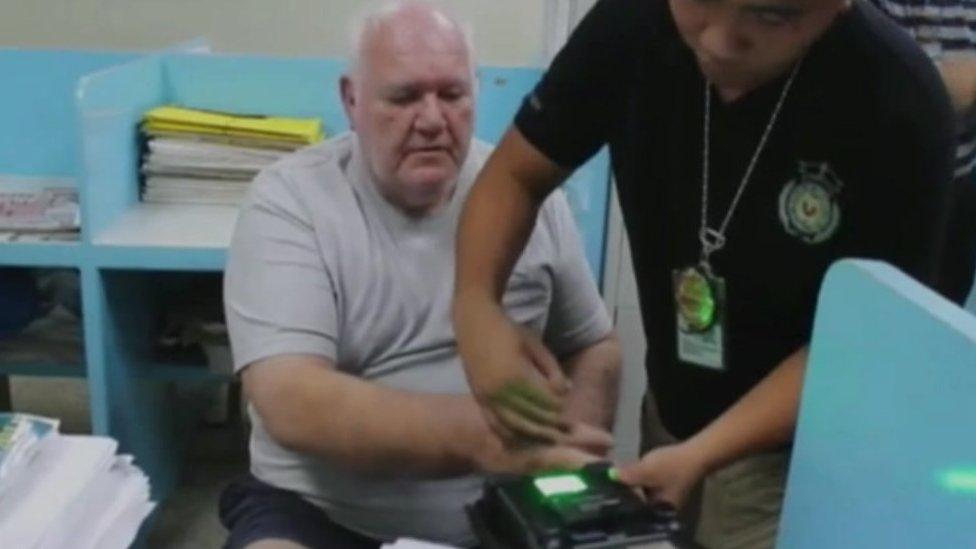Douglas Slade and the Paedophile Information Exchange
- Published
One of Slade's victims has spoken of the abuse he suffered
As 75-year-old paedophile Douglas Slade is jailed for child abuse and rape, the BBC examines his links to notorious 1970s group the Paedophile Information Exchange (PIE), which campaigned to legalise sex with children.
It is hard to comprehend now but in the 1970s Slade openly ran a helpline for child sex abusers from his parents' home in suburban Bristol.
As he was sentenced at the end of his recent trial, the judge said Slade had "boasted of his involvement" with PIE.
The group campaigned for "children's sexuality", calling on the government to axe or lower the age of consent so that adults could have sex with children without breaking the law.
It existed for more than 10 years and received invitations from student unions, won sympathetic media coverage and found academics who supported its campaign. It was even affiliated to the National Council for Civil Liberties - now Liberty.
Joining PIE was easy; according to a Times report in February 1977 just an application and a cheque for £4 was needed. By October 1976 it was reported that the group had 200 members.

In 1975 Slade was pictured on the front page of the Sunday People but his abuse carried on for decades
But behind this questionable veneer of respectability, Slade was a "manipulative and dangerous man," who helped members of PIE groom vulnerable children; passing victims between themselves for sex.
Det Sgt Paul Melton, from Avon and Somerset Police, spent years building a case against Slade.
He said Slade "was one of the main instigators" of the group, seemingly impervious to the law, who were running a "helpline" for paedophiles, passing on advice to other members about how to groom and abuse children.
"They took advantage of the trends of the time," said Gabrielle Shaw, from the National Association for People Abused in Childhood.
"In the mid-70s it was all about the fight for civil liberties and the trend towards sexual freedom... what it was really about was to normalise sex with children."

Victim's story
Robert - not his real name - met Slade in 1980 when he was 15 years old. He was repeatedly raped and offered to other men during visits to Slade's Bristol home.
"I was in a desperate situation at home," he recalls, "I was looking for somewhere that would be a refuge for me."
But instead of a sanctuary, Robert unwittingly found himself at the centre of an organised network of paedophiles who systematically raped and abused him.
It was a combination of mistrust and conflicting emotions that prevented Robert reporting his abuser: "Slade showed me what I thought was affection and, because of my home life, it was something I was desperate for... he treated me very kindly.
"He groomed me so I was malleable and would be used for the sexual gratification of him and other men."

Slade's sexual abuse of boys was exposed in 1975 when a Sunday newspaper described him as one of "the vilest men in Britain".
They named him and two other men, linking them to PIE, but, despite the headlines, Slade continued abusing children and the group carried on campaigning.
A series of explosive investigations in the 1980s finally triggered the group's demise.
In 1983, Scotland Yard was handed a dossier about PIE by a headmaster, Charles Oxley. He said he had infiltrated the group, which he claimed had about 1,000 members.
Finally the authorities acted and PIE's chairman Tom O'Carroll was jailed for two years. By 1984 the group had disbanded.

Douglas Slade was deported from the Philippines in 2015
However, Slade himself managed to evade prosecution and in 1985 moved to the Philippines. He boasted he could pay off anyone who became suspicious of him.
Avon and Somerset Police would later fight a six-year battle to have him deported, and he was finally arrested by Filipino immigration authorities.
In 2015, he arrived back in the UK to face eight charges of sexual abuse.
During police interviews, Det Sgt Melton said Slade "possessed a certain arrogance" and was in "complete denial" about his actions.
"He's an extremely manipulative man... he's a dangerous man."
For the victims of the PIE paedophiles, the conviction of Slade provides some form of closure.
"They are sexually driven and have no compassion, not for me or the many, many children they have abused," said Robert.
"I don't believe they have any thoughts for what they have done; they don't believe they have done anything wrong - for them it's perfectly natural."
- Published27 February 2014

- Published12 January 2016

- Published11 September 2015
